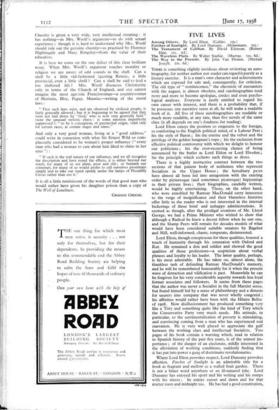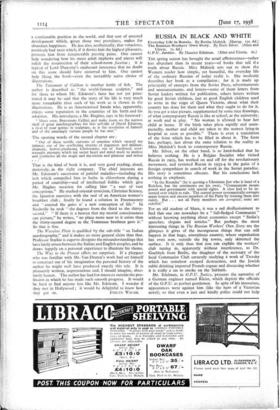FIVE LIVES .
Among Others. By Lord Elton. (Collins. t5s.)
THERE is something slightly invidious about reviewing an auto- biography, for neither author nor reader can regard it purely as a
literary exercise. It is a man's own character and achievements which are exposed for sale 'and, consequently, for criticism. The old type of " reminiscence," the chronicle of encounters with the august, is almost obsolete, and autobiographies tend more and more to become apologias, credos and even psycho- logical analyses. Everyone is justly entitled to regard his own career with interest, and there is a probability that, if he possesses any narrative sense at all, he will make a readable book of it. All five of these autobiographies are readable or much more readable, at any rate, than five novels of the same class (it all depends on one's fondness for reading).
Lord Elton enjoys the position so enigmatic to the foreign, so comforting to the English political mind, of a Labour Peer ; his the style of Baron ; his the ermine and the velvet and the privilege of the golden hangman's rope ; his the exclusion from effective political controversy with which we delight to honour our politicians ; his the ever-recurring chance of being announced by the butler as Lord Eldon or Lord Elveden ; his the principle which eschews such things as dross.
There is a highly instructive contrast between the two sections of that patient body of noblemen who represent Socialism in the Upper House ; the hereditary peers have almost all been led into antagonism with the existing order by picturesque (and sometimes picaresque) happenings in their private lives ; their biographies, candidly written, would be highly entertaining. Those, on the other hand, who were ennobled by Ramsay MacDonald carry innocence to the verge of insignificance and their blameless histories offer little to the reader who is not interested in the internal bickerings of those brief and unhappy administrations. It seemed as though, after the prodigal creations of Mr. Lloyd George, 'we had a Prime Minister who wished to show that although a Radical he knew a decent fellow when he saw one, and the Slump Peers will remain for decades models of what would have been considered suitable senators by Bagehot and Mill, well-informed, chaste, temperate, disinterested.
Lord Elton, though conspicuous for these qualities, boasted a touch of humanity through his connexion with Oxford and Kut. He remained a don and soldier and showed the good qualities of those professions—a scepticism about verbal phrases and loyalty to his leader. The latter quality, perhapt, is his most admirable. He has taken on, almost alone, the thankless task of defending Ramsay MacDonald's memory, and he will be remembered honourably for it when the present wave of detraction and vilification is past. Meanwhile he can be forgiven for his very considerable asperity towards less loyal former associates and followers. It seems from these pages that the author was never a Socialist in the full Marxist sense,
but found himself led by a sense of philanthropy and a distaste for usurers into company that was never wholly congenial ;
his affinities would rather have been with the Hilaire Belloc of 1908. Now disillusionment has produced something very like a 'Tory and something quite like the kind of Tory which the Conservative Party very much needs. His attitude,. in particular, to the sentimentalisation of poverty is stimulating, and convincing coming from a man who has experienced real starvation. He is very well placed to appreciate the gulf between the working class and intellectual Socialists. Two pages of his book contain a warning which, read in relation to Spanish history of the past five years, is of the utmost im- portance ; of the danger of an electorate, mildly interested in the alleviation of working conditions, suddenly finding that it has put into power a gang of doctrinaire revolutionaries.
Where Lord Elton provokes respect, Lord Dunsany provokes affection. Patches of Sunlight is an admirable title for a
book as fragrant and mellow as a walled fruit garden. There
is not a bitter word anywhere or an ill-natured joke. Lord Dunsany has enjoyed- his -sport and his writing and his romps with his nieces ; he enjoys 'sunset and dawn and for that matter noon and-midnight too. He has had a good constitution,
a comfortable position in the world, and that sort of arrested development which, .given those two postulates, makes for abundant happiness. He has also, aesihetically, that voracious, positively bad taste which, if it denies Writ the highest pleasures, protects him from innumerable passing pains. Orie cannot help wondering how his more adult nephews and nieces will relish the resurrection of their school-room facetiae ; it is typical of Lord Dunsany's exuberant innocence that no doubt on this score should have occurred to him. One cannot help liking the book—even the incredibly naive choice of illustrations.
The Testament of Caliban is another kettle of fish. The author is described as " the world-famous sculptor," and for those to whom Mr. Edstrom's fame has not yet pene-
trated it may be said that the story of his life is very much more remarkable than such of his work as is shown in the illustrations. He is an Americanised Swede who, apparently, enjoys some reputation in the countries of his birth and his adoption. His introducer, a Mr. Hughes, says in his foreword :
" Move over, Benvenuto Cellini, and make room on the narrow shelf of great autobiographies for this self-life of David Edstrom, a rival of your genius in sculpture, as is the revelation of himself and of the amazingly various people he has met."
The opening words of the second chapter are : " Out of these terrific currents of emotion which swayed my infancy, out of the conflicting streams of paganism and militant, dramatic, horror-producing Christianity, out of burdened, over- wrought attempts- which my secret heart and mind made to analyse and synthetise all the magic and mysticism and glamour and terror
•
That is the kind of book it is, and very good reading, aloud, derisively, in the right company. .The chief interests are Mr. Edstrom's succession of painful maladies—including the itch which compelled him to bathe in chloroform during a period of courtship—and of intellectual foibles which give Mr. Hughes occasion for calling him " a seer of vast conceptions." He studied oriental eroticism, Christian Science, the Ignation exercises with the zeal of an American women's breakfast club ; finally he found a solution in Freemasonry and entered the gates o7 a new conception of life." In Nashville he took " the degrees from the third to the thirty- second." " If there is a heaven that my mortal consciousness can picture," he writes, " no place more near to it exists than the thirty-second degree as the _Tennessee brethren gave it." So that is fine.
The Waveless Plain is qualified by the sub-title " an Italian autobiography," and it makes no more general claim than that. Professor Starkie is eager to dissipate the misunderstandings that have lately arisen between the Italian and English peoples, and he draws happily on a personal experience to illustrate his theme.
The Way to the Present offers no surprises. If a playgoer who was familiar with Mr. Van Druten's work had set himself to construct out of his imagination the personal history of the author, he might well have produced exactly this tale. It is pleasantly written, unpretentious and, I should imagine, abso- lutely honest. The author has had few interests outside the pro- fession in which he has made such smooth progress. It would be hard to find anyone less like Mr. Edstrom. I wonder if they met in Hollywood ; it would be delightful to know how



















































 Previous page
Previous page